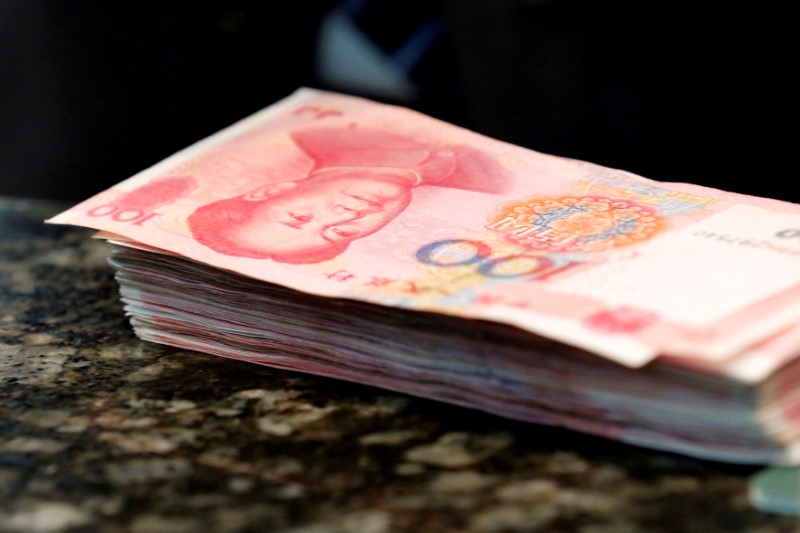By Winni Zhou and John Ruwitch
SHANGHAI (Reuters) - China's central bank moved to calm jittery financial markets on Tuesday after the yuan dropped through the psychologically significant 6.7 to the dollar mark, hitting its lowest in almost a year as anxieties over U.S. trade frictions deepened.
Stocks also sank in morning trade as Beijing and Washington hurtled toward an end-of-week tariff deadline that has kept investors in China nervous, although they recouped their losses and ended the day in positive territory.
Chinese currency
The sustained fall in stocks and the yuan appeared to be rattling the authorities.
In a statement posted on the website of the People's Bank of China, Governor Yi Gang said the central bank was closely watching fluctuations in the foreign exchange market and would seek to keep the yuan at a stable and reasonable level. Cross-border capital flows were under control, Yi said.
State-controlled media earlier called the fall in stocks an "irrational overreaction" and urged investors not to panic over the growing trade frictions.
After the morning drop, market participants suspected the central bank of intervening in the currency market to support the yuan.
The yuan fell to 6.7204 per dollar, its weakest since Aug. 7, 2017 and the first time it dropped below 6.7 since Aug. 9, 2017, before crossing back and forth over the line.
By 0803 GMT, it had recovered to 6.6858 though the currency has lost more than 4 percent of its value against the dollar since mid-June.
"It's a crucial day for the yuan today given it weakened past 6.7 per dollar," said Ken Cheung, senior Asian FX strategist at Mizuho Bank in Hong Kong.
"Let's see what level the yuan closes today, and see whether the central bank would take out some measures to stabilize the exchange rate."
In August last year, 6.7 was the level around which China's authorities relaxed restrictions on the yuan, a move that was followed by a gradual appreciation over the next 8 months.
Four traders told Reuters that major state-owned banks were seen swapping yuan for dollars in the forwards market on Tuesday and immediately selling some of them into spot market, which helped support the Chinese currency.
Traders and economists say major state-owned banks sometimes act on behalf of the central bank in the foreign exchange interbank market.
The central bank did not immediately respond to Reuters' request for comment on the yuan's moves.
"It feels like the state-owned banks are stocking up on bullets to prevent the yuan from falling too much," said one trader at a Chinese bank in Shanghai.
The central bank earlier set the midpoint
Speaking in the morning at an event to mark the one-year anniversary of a scheme that links Hong Kong and mainland bond markets, PBOC deputy governor and head of the foreign exchange regulator Pan Gongsheng said China was confident it could keep the yuan basically stable and at a "reasonable" level.
Traders said statements from the PBOC officials went some way toward calming the market.
TRADE CONDITIONS
State-run media also sought to reassure investors with the Economic Daily describing U.S.-China trade frictions as "a test" the economy had to undergo during its rise.
"We have long anticipated and prepared for this...The impact on the Chinese economy is within a controllable range," the newspaper said.However, the outlook for Sino-U.S. trade relations was further clouded on Tuesday by Washington's moves to block China Mobile (HK:0941) from offering services in the U.S. and news that growth in China's exports to the United States has slowed significantly this year.
Analysts at Commerzbank (DE:CBKG) said in a note on Tuesday that while concerns about the trade conflict were creating a drag on the yuan, they did not expect the government to use the exchange rate as a weapon in the trade dispute.
"The uncertainty related to the trade conflict, the weak growth outlook and the easing bias in Chinese monetary policy suggest a weaker renminbi in the coming quarters," they wrote.
In equities, the blue chip CSI300 Index (CSI300) slumped by more than 2 percent in the morning trading session, and the Shanghai Composite Index (SSEC) was down more than 1 percent before staging an afternoon comeback. By the end of the day, the Shanghai Composite was up 0.39 percent while the CSI300 had risen 0.03 percent.
Hong Kong's Hang Seng Index (HSI) was hammered after a one-day hiatus on Monday to mark the day that the former British colony was returned to China. It was down by around 3 percent before clawing back some losses in the afternoon to close 1.4 percent lower.
Yan Kaiwen, an analyst with China Fortune Securities, said the recovery in China stocks was a "technical rally" that followed the recent selloff.

"There is still downside potential for the blue-chip stocks amid trade war and economic worries," Yan said.